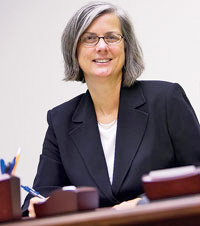From the Provost: Engaged Learning
 Our campus has expanded to include “classrooms” and “satellite campuses” throughout the world. Through active engagement with service learning and community-based research, faculty and students use the community as teaching and research laboratories. “Community classrooms” are as close as downtown Easton and as far away as New Orleans, Honduras, Madagascar, and New Zealand.
Our campus has expanded to include “classrooms” and “satellite campuses” throughout the world. Through active engagement with service learning and community-based research, faculty and students use the community as teaching and research laboratories. “Community classrooms” are as close as downtown Easton and as far away as New Orleans, Honduras, Madagascar, and New Zealand.
We have moved beyond the “teaching as telling, learning as recall” approach because we know that this mode of instruction can fall short of providing real understanding. Faculty from the College’s four academic divisions are using innovative approaches to engage students in and out of the classroom, adapting assignments to enable students to relate course materials to real-world problems and to view these problems from a variety of perspectives. Courses combine experience in the community with rigorous academic work and structured reflection. Community-based research involves faculty, students, and community members in joint research to solve community problems.
Our definition of community is broad. It could be an on-campus community, as when students in a civil engineering class developed plans for making Metzgar Fields a sustainable community resource. Community could be in Easton or the Lehigh Valley, such as when a research team examined the potential economic impact of converting an historic downtown building into an art and culture athenaeum or when students in a mathematics class worked with a non-profit organization to develop a business plan for microloans. Our communities are found in locations around the world, including Madagascar, where students mentored Malagasy students to help increase their success in enrolling at colleges and universities in the United States and elsewhere.
Community-based learning and research are among creative, active pedagogies that enhance students’ capacity to think critically, solve problems, and function as citizens in a democratic society—all core values of a Lafayette liberal arts education. Such approaches, which also include problem-based learning, inquiry-based laboratories, design teams, honors and independent study, and internships with reflection, are common at Lafayette. It has been an especially exciting year for faculty to explore pedagogies of engagement, thanks to the opening of the Center for the Integration of Teaching, Learning, and Scholarship. Housed in the newly dedicated Scott Hall and under the inaugural direction of Professor Alan Childs, the center reinforces our commitment to providing the best possible educational experience for both teacher and student.
Lafayette faculty are keenly aware that engaged-learning approaches deepen understanding and help students develop increasingly complex ways of thinking, knowing, and making meaning. They require academic intensity by students and have the greatest potential to transform attitudes and behaviors. They also lead students to take more responsibility for their learning and for its connection to both their individual development and their civic lives.
Wendy L. Hill
Provost, Dean of the Faculty,
and Rappolt Professor of Neuroscience